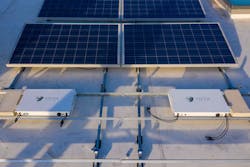SolarLeaf designer Yotta Energy gains $13M new funding to scale up microgrids for business customers
A startup which is creating a product to connect battery storage directly with individual solar panels on commercial buildings has gained $13 million in a new round of funding from a host of joint venture backers.
Austin, Texas-based Yotta Energy raised the Series A round to help scale up its design to create microgrids for business buildings. The round was led by WIND Ventures with additional investment from Doral Energy-Tech Ventures, Riverstone Ventures, EDP Ventures and SWAN Impact Network.
The new round brings Yotta Energy’s total funding to $20 million.
“Commercial solar and storage technology has the potential to completely transform energy markets, especially in the U.S. and Latin America,” said Brian Walsh, Head of WIND Ventures. “Yotta’s technology represents a better, more affordable solution for growing this commercial and industrial segment on a global scale with seamless renewable energy integration that turns both existing and future buildings into distributed power plants.”
Yotta’s SolarLeaf is a distributed battery which is installed under individual solar panels. The module-level battery uses lithium-iron-phosphate chemistry and is spaced about three feet between each unit.
Each battery has a 1-kWh nominal capacity, ideally sizing up to 1 MWh per scaled system once fully installed.
“Yotta's storage technology revolutionizes renewable projects and transforms the commercial and industrial markets with the first truly integrated solar and storage solution,” said Roee Furman, Managing Director for Doral Energy-Tech Ventures. “The company’s distributed PV-Coupled architecture transforms solar and storage installations with a dramatic cost reduction, ease of use, and elegant product design. After reviewing dozens of storage solutions, we chose Yotta for growth and taking the lead in this segment, with various installed projects and commercially ready products.”
The Yotta Energy solution is specifically designed for flat roofs. It can store the excess solar power generated on-site and also act as revenue generator by selling power back into the grid.
The smaller footprint is considered to lower installation costs while providing the energy security and lower-carbon benefits of hybrid solar-storage projects.
About the Author
EnergyTech Staff
Rod Walton is senior editor for EnergyTech.com. He has spent 17 years covering the energy industry as a newspaper and trade journalist.
Walton formerly was energy writer and business editor at the Tulsa World. Later, he spent six years covering the electricity power sector for Pennwell and Clarion Events. He joined Endeavor and EnergyTech in November 2021.
He can be reached at [email protected].
EnergyTech is focused on the mission critical and large-scale energy users and their sustainability and resiliency goals. These include the commercial and industrial sectors, as well as the military, universities, data centers and microgrids.
Many large-scale energy users such as Fortune 500 companies, and mission-critical users such as military bases, universities, healthcare facilities, public safety and data centers, shifting their energy priorities to reach net-zero carbon goals within the coming decades. These include plans for renewable energy power purchase agreements, but also on-site resiliency projects such as microgrids, combined heat and power, rooftop solar, energy storage, digitalization and building efficiency upgrades.
